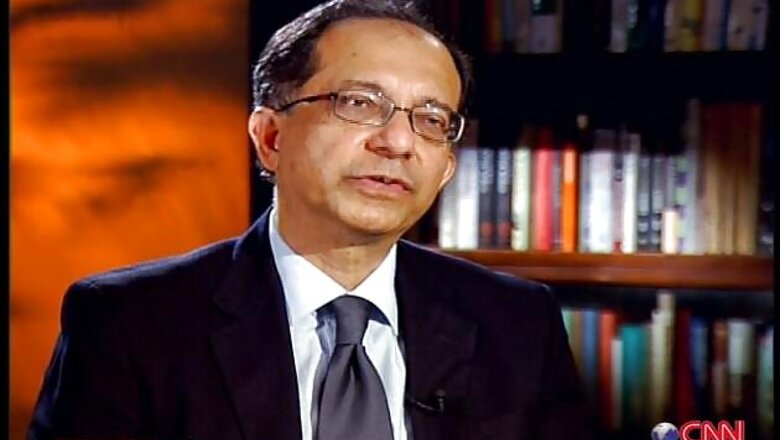
views
In an interview to CNBC-TV18's Latha Venkatesh, Kaushik Basu, chief economist of World Bank spoke about his reading of the global economy and his outlook.
Below is a verbatim transcript of the interview:
Q: You aren't one of us at this point in time, in a way, as the World Bank Economist. We want you to tell us: what the world wants from India? However, before that a word on the World Bank estimates itself. You'll had been optimistic with your growth estimates for the US and for China for this year but some weak numbers in both these economies have roiled markets in 2014. Will the World Bank rethink its numbers?
A: The World Bank's most recent official forecast that we have put out, just some broad numbers for the US, the growth in the year 2013 was 1.8 per cent. Our analysis suggests that there is going to be a bit of a pick up this year. So, US should go up to a growth of 2.8 per cent from 1.8 to 2.8 per cent. China's last year growth was 7.7 per cent. Our expectation is China will remain at 7.7 per cent for the year 2014.
Having said this, what you are alluding to in your question is over the last couple of weeks there has been some concern about the scenario not being quite as good as what we were expecting two-three weeks ago when we put out our forecast. Indeed there is a little bit of concern that the Chinese purchasing managers index (PMI) has not done well enough, that the manufacturing sector is under a little bit of strain.
As we know and the People's Bank and the Government in China, they are fully aware, China has a very large shadow banking sector that will have to be tamed at some point. So, there are some concerns that when this financial taming in takes place there could be a little bit of rocking in the Chinese economy. China is today sufficiently interlinked with the global economy that, that can have implications for the rest of the world.
For the US, the outlook was beginning to improve despite some weakness in the jobs data but there are still some important underlying concerns in the US. One particular indicator that people don't talk about too much but is important is of the unemployed people in the US. Close to 40 per cent happened to be long-term unemployed, which is very unusual in the US because usually in the United States people become unemployed and then they again find a job. Long-term unemployment where you remain unemployed for a very long time is unusual in the US and that has become very large. It leads to an erosion of productivity. So, these overall relatively good forecasts have these underlining concerns both about China and United States.
Q: The Indian statistical organisation, the CSO, has put GDP at 4.9 per cent for the current year and estimates for the next year are just running a little north of 5 per cent. What is your sense?
A: Let me give you the official World Bank number, which is our model and econometric analysis puts down the growth forecast for the year 2014 and World Bank gives you the calendar year 2014 at 6.2 per cent growth. So, our official expectation is that the growth, which has gone down to 4.9 per cent or 4.8 per cent for the calendar year 2013, it is going to pick up this year and could go to 6.2 per cent.
So, again the point expectation for India is relatively good. As with all economies, and in particular with India, with an election coming up, it is possible that it will not go by 6.2 per cent. It is going to grow less. However, again my overall personal expectation over the next two years is that India's growth is going to inch back up to where it was earlier before this last two years of the slowdown. India should get back up there for again the good reason that India also has strengths in terms of its investment and savings rate. Both of these have gone down but still it is at a very substantial figure.
One more thing which is worth stressing is 4.9 per cent growth is not good by India's own recent experience. However, in today's growth chart across the world 4.8 or 4.9 per cent is not bad performance at all. It slowed down all over the place and so with 4.8 or 4.9 per cent growth India is still among the top 10-12 growing countries in the world. So, it is still doing well, but not as well as what India was doing say from 2005 to 2008 when India was crossing 9 per cent growth each of those years.
Q: Monday is the interim Budget day. What is it you want to hear really?
A: I don't follow the Indian economy nearly as closely as I used to do. However, let me nevertheless tell you, the Indian economy used its fiscal injections to get the growth up very well from 2008 when the global economy was being hit. However, a fiscal deficit being used as an instrument to push up growth is like the use of an antibiotic; very effective for a couple of years but you can't do that for too long.
For India, there is a pressing need to continue with fiscal consolidation. So, I feel during the next Budget-and who knows? Let us hope that there won't be another Budget in another couple of months-but over the next say two or three Budgets, it has to be a fiscal consolidation so that by the time another major crisis comes we are sufficiently tight fiscally that we can go in for a fiscal expansion should the need arise.
So, fiscal consolidation brings the fiscal deficit down very steadily. Debt-to-GDP ratio, by the standards of European countries, India is not bad. Nevertheless, India needs to reign on that as well. So, fiscal consolidation has to be the mantra over the next certainly the two Budgets I would say. That has to be the corner stone of how we do our budgetary policy.



















Comments
0 comment